Dmitrii Usynin
Distributed Machine Learning and the Semblance of Trust
Dec 21, 2021
Abstract:The utilisation of large and diverse datasets for machine learning (ML) at scale is required to promote scientific insight into many meaningful problems. However, due to data governance regulations such as GDPR as well as ethical concerns, the aggregation of personal and sensitive data is problematic, which prompted the development of alternative strategies such as distributed ML (DML). Techniques such as Federated Learning (FL) allow the data owner to maintain data governance and perform model training locally without having to share their data. FL and related techniques are often described as privacy-preserving. We explain why this term is not appropriate and outline the risks associated with over-reliance on protocols that were not designed with formal definitions of privacy in mind. We further provide recommendations and examples on how such algorithms can be augmented to provide guarantees of governance, security, privacy and verifiability for a general ML audience without prior exposure to formal privacy techniques.
Complex-valued deep learning with differential privacy
Oct 07, 2021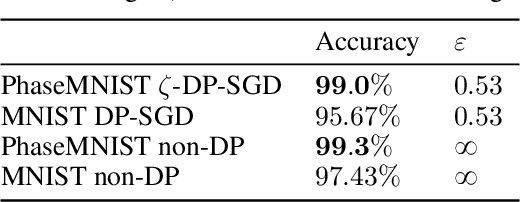
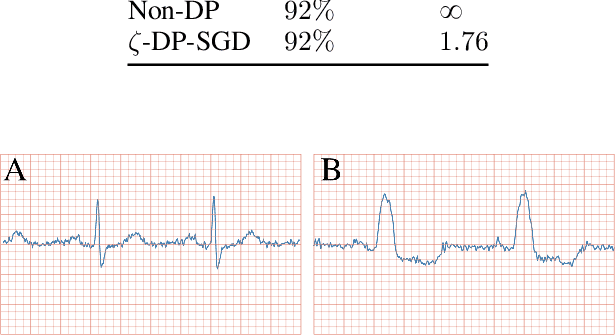
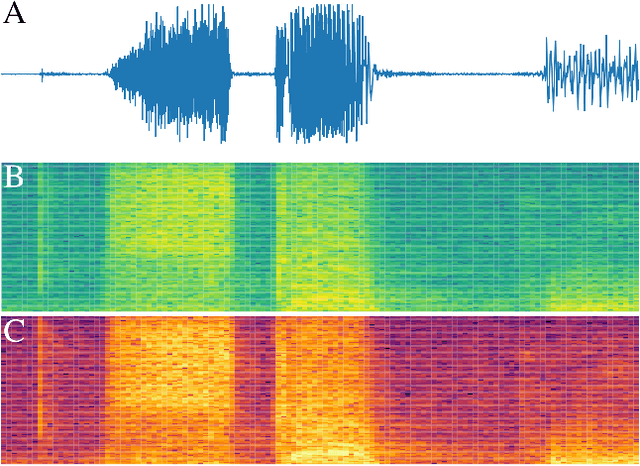
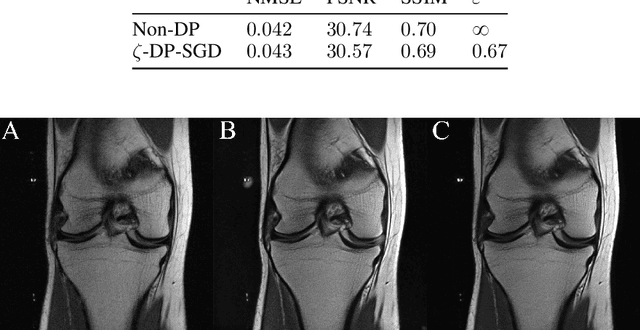
Abstract:We present $\zeta$-DP, an extension of differential privacy (DP) to complex-valued functions. After introducing the complex Gaussian mechanism, whose properties we characterise in terms of $(\varepsilon, \delta)$-DP and R\'enyi-DP, we present $\zeta$-DP stochastic gradient descent ($\zeta$-DP-SGD), a variant of DP-SGD for training complex-valued neural networks. We experimentally evaluate $\zeta$-DP-SGD on three complex-valued tasks, i.e. electrocardiogram classification, speech classification and magnetic resonance imaging (MRI) reconstruction. Moreover, we provide $\zeta$-DP-SGD benchmarks for a large variety of complex-valued activation functions and on a complex-valued variant of the MNIST dataset. Our experiments demonstrate that DP training of complex-valued neural networks is possible with rigorous privacy guarantees and excellent utility.
Partial sensitivity analysis in differential privacy
Sep 22, 2021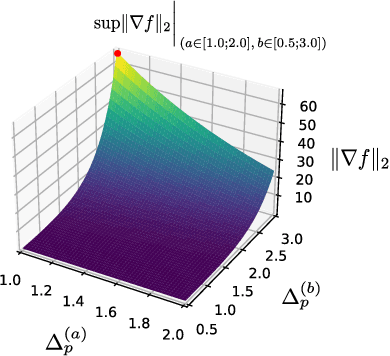
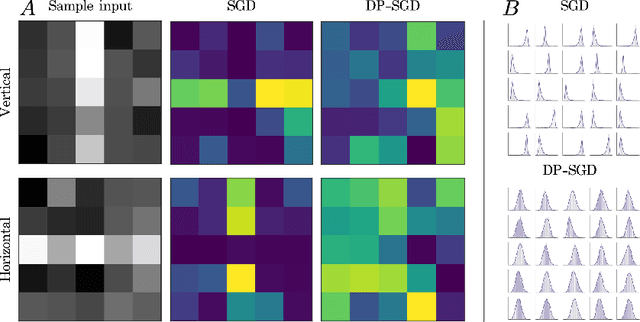
Abstract:Differential privacy (DP) allows the quantification of privacy loss when the data of individuals is subjected to algorithmic processing such as machine learning, as well as the provision of objective privacy guarantees. However, while techniques such as individual R\'enyi DP (RDP) allow for granular, per-person privacy accounting, few works have investigated the impact of each input feature on the individual's privacy loss. Here we extend the view of individual RDP by introducing a new concept we call partial sensitivity, which leverages symbolic automatic differentiation to determine the influence of each input feature on the gradient norm of a function. We experimentally evaluate our approach on queries over private databases, where we obtain a feature-level contribution of private attributes to the DP guarantee of individuals. Furthermore, we explore our findings in the context of neural network training on synthetic data by investigating the partial sensitivity of input pixels on an image classification task.
An automatic differentiation system for the age of differential privacy
Sep 22, 2021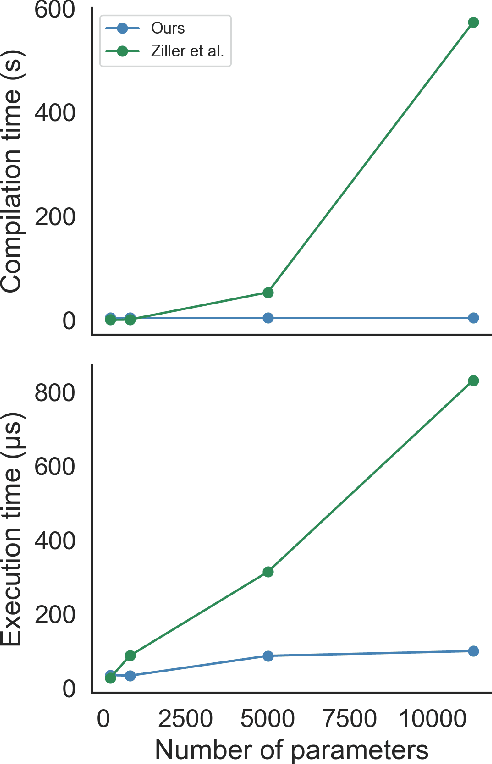
Abstract:We introduce Tritium, an automatic differentiation-based sensitivity analysis framework for differentially private (DP) machine learning (ML). Optimal noise calibration in this setting requires efficient Jacobian matrix computations and tight bounds on the L2-sensitivity. Our framework achieves these objectives by relying on a functional analysis-based method for sensitivity tracking, which we briefly outline. This approach interoperates naturally and seamlessly with static graph-based automatic differentiation, which enables order-of-magnitude improvements in compilation times compared to previous work. Moreover, we demonstrate that optimising the sensitivity of the entire computational graph at once yields substantially tighter estimates of the true sensitivity compared to interval bound propagation techniques. Our work naturally befits recent developments in DP such as individual privacy accounting, aiming to offer improved privacy-utility trade-offs, and represents a step towards the integration of accessible machine learning tooling with advanced privacy accounting systems.
A unified interpretation of the Gaussian mechanism for differential privacy through the sensitivity index
Sep 22, 2021


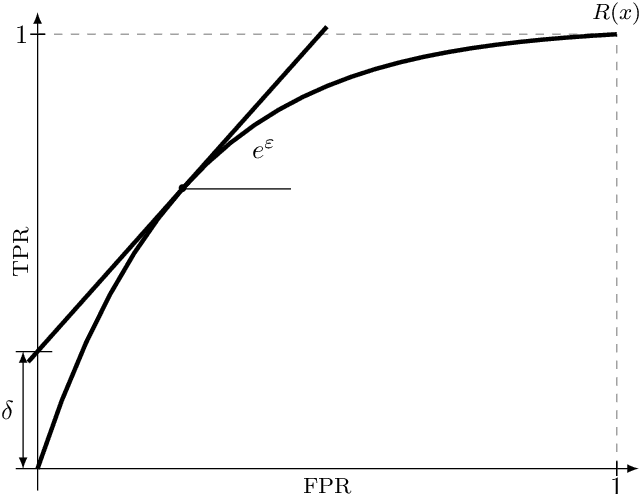
Abstract:The Gaussian mechanism (GM) represents a universally employed tool for achieving differential privacy (DP), and a large body of work has been devoted to its analysis. We argue that the three prevailing interpretations of the GM, namely $(\varepsilon, \delta)$-DP, f-DP and R\'enyi DP can be expressed by using a single parameter $\psi$, which we term the sensitivity index. $\psi$ uniquely characterises the GM and its properties by encapsulating its two fundamental quantities: the sensitivity of the query and the magnitude of the noise perturbation. With strong links to the ROC curve and the hypothesis-testing interpretation of DP, $\psi$ offers the practitioner a powerful method for interpreting, comparing and communicating the privacy guarantees of Gaussian mechanisms.
NeuralDP Differentially private neural networks by design
Aug 10, 2021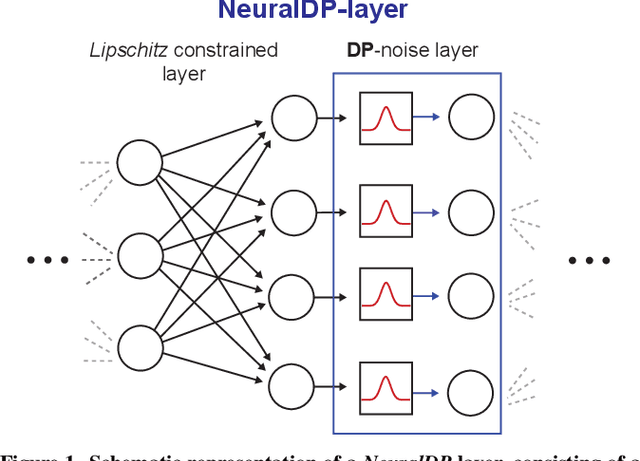
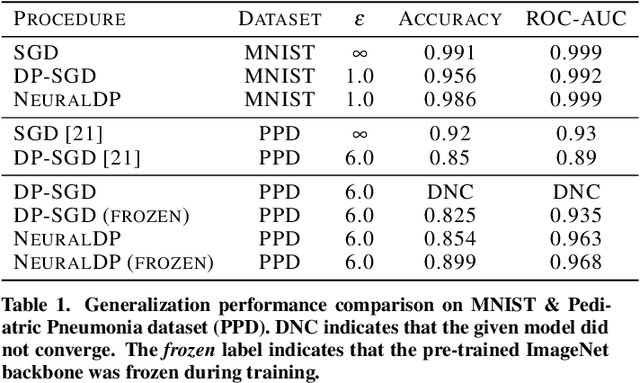
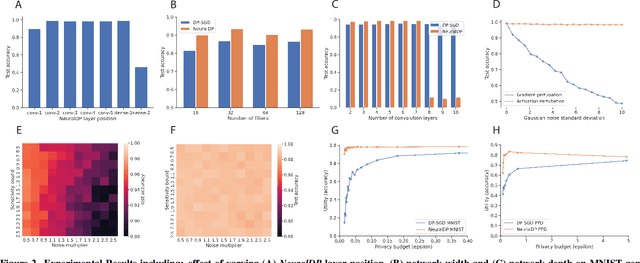
Abstract:The application of differential privacy to the training of deep neural networks holds the promise of allowing large-scale (decentralized) use of sensitive data while providing rigorous privacy guarantees to the individual. The predominant approach to differentially private training of neural networks is DP-SGD, which relies on norm-based gradient clipping as a method for bounding sensitivity, followed by the addition of appropriately calibrated Gaussian noise. In this work we propose NeuralDP, a technique for privatising activations of some layer within a neural network, which by the post-processing properties of differential privacy yields a differentially private network. We experimentally demonstrate on two datasets (MNIST and Pediatric Pneumonia Dataset (PPD)) that our method offers substantially improved privacy-utility trade-offs compared to DP-SGD.
Differentially private training of neural networks with Langevin dynamics for calibrated predictive uncertainty
Aug 04, 2021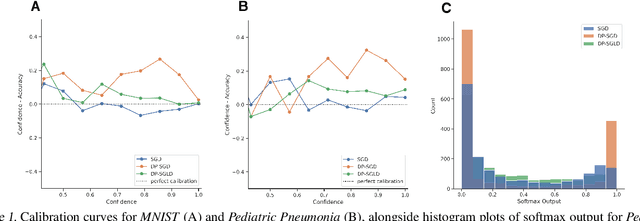


Abstract:We show that differentially private stochastic gradient descent (DP-SGD) can yield poorly calibrated, overconfident deep learning models. This represents a serious issue for safety-critical applications, e.g. in medical diagnosis. We highlight and exploit parallels between stochastic gradient Langevin dynamics, a scalable Bayesian inference technique for training deep neural networks, and DP-SGD, in order to train differentially private, Bayesian neural networks with minor adjustments to the original (DP-SGD) algorithm. Our approach provides considerably more reliable uncertainty estimates than DP-SGD, as demonstrated empirically by a reduction in expected calibration error (MNIST $\sim{5}$-fold, Pediatric Pneumonia Dataset $\sim{2}$-fold).
Sensitivity analysis in differentially private machine learning using hybrid automatic differentiation
Jul 09, 2021Abstract:In recent years, formal methods of privacy protection such as differential privacy (DP), capable of deployment to data-driven tasks such as machine learning (ML), have emerged. Reconciling large-scale ML with the closed-form reasoning required for the principled analysis of individual privacy loss requires the introduction of new tools for automatic sensitivity analysis and for tracking an individual's data and their features through the flow of computation. For this purpose, we introduce a novel \textit{hybrid} automatic differentiation (AD) system which combines the efficiency of reverse-mode AD with an ability to obtain a closed-form expression for any given quantity in the computational graph. This enables modelling the sensitivity of arbitrary differentiable function compositions, such as the training of neural networks on private data. We demonstrate our approach by analysing the individual DP guarantees of statistical database queries. Moreover, we investigate the application of our technique to the training of DP neural networks. Our approach can enable the principled reasoning about privacy loss in the setting of data processing, and further the development of automatic sensitivity analysis and privacy budgeting systems.
Differentially private federated deep learning for multi-site medical image segmentation
Jul 06, 2021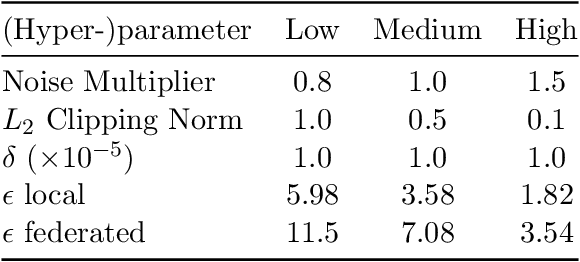
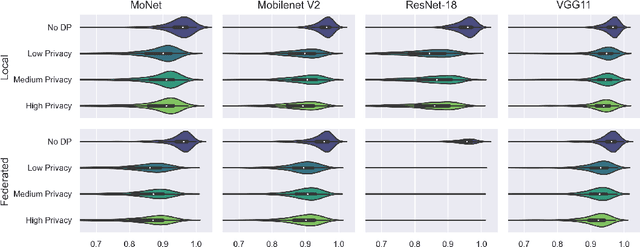


Abstract:Collaborative machine learning techniques such as federated learning (FL) enable the training of models on effectively larger datasets without data transfer. Recent initiatives have demonstrated that segmentation models trained with FL can achieve performance similar to locally trained models. However, FL is not a fully privacy-preserving technique and privacy-centred attacks can disclose confidential patient data. Thus, supplementing FL with privacy-enhancing technologies (PTs) such as differential privacy (DP) is a requirement for clinical applications in a multi-institutional setting. The application of PTs to FL in medical imaging and the trade-offs between privacy guarantees and model utility, the ramifications on training performance and the susceptibility of the final models to attacks have not yet been conclusively investigated. Here we demonstrate the first application of differentially private gradient descent-based FL on the task of semantic segmentation in computed tomography. We find that high segmentation performance is possible under strong privacy guarantees with an acceptable training time penalty. We furthermore demonstrate the first successful gradient-based model inversion attack on a semantic segmentation model and show that the application of DP prevents it from divulging sensitive image features.
Privacy-preserving medical image analysis
Dec 10, 2020
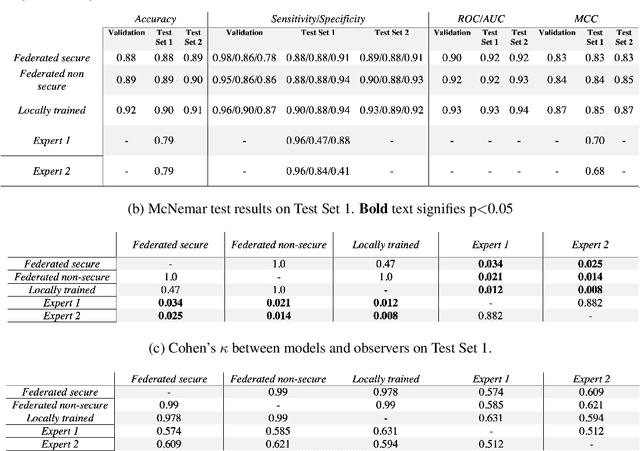
Abstract:The utilisation of artificial intelligence in medicine and healthcare has led to successful clinical applications in several domains. The conflict between data usage and privacy protection requirements in such systems must be resolved for optimal results as well as ethical and legal compliance. This calls for innovative solutions such as privacy-preserving machine learning (PPML). We present PriMIA (Privacy-preserving Medical Image Analysis), a software framework designed for PPML in medical imaging. In a real-life case study we demonstrate significantly better classification performance of a securely aggregated federated learning model compared to human experts on unseen datasets. Furthermore, we show an inference-as-a-service scenario for end-to-end encrypted diagnosis, where neither the data nor the model are revealed. Lastly, we empirically evaluate the framework's security against a gradient-based model inversion attack and demonstrate that no usable information can be recovered from the model.
 Add to Chrome
Add to Chrome Add to Firefox
Add to Firefox Add to Edge
Add to Edge